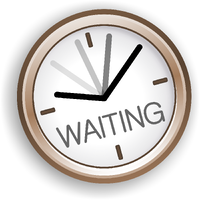 From the lyrics of Carly Simon's song, Anticipation.... "is keeping me waiting." Waiting and wondering are two very dangerous words in customer service, and yet I experience both, often. How many times have you been in a store, hotel, restaurant, or doctor's office standing in line, where clearly the person behind the counter sees you, but does not acknowledge you? They can look right at you, but choose to say nothing, and somehow they are comfortable with letting you stand and wait. Is this a training issue, or an acceptable business practice for some businesses, or are some people wired in such a way that they don't understand or can't anticipate the effects of this on a consumer?
From the lyrics of Carly Simon's song, Anticipation.... "is keeping me waiting." Waiting and wondering are two very dangerous words in customer service, and yet I experience both, often. How many times have you been in a store, hotel, restaurant, or doctor's office standing in line, where clearly the person behind the counter sees you, but does not acknowledge you? They can look right at you, but choose to say nothing, and somehow they are comfortable with letting you stand and wait. Is this a training issue, or an acceptable business practice for some businesses, or are some people wired in such a way that they don't understand or can't anticipate the effects of this on a consumer?
"We wildly underestimate the power of the tiniest personal touch." -Tom Peters
There will always be service disappointments, but teaching employees, at every level, the skill of how to anticipate, as well as handle, difficult service situations, will have such a positive effect on the overall customer experience. Organizations must authentically be customer focused to pull this off successfully. In order to anticipate another's needs you have to see the world through your customers' eyes. In regards to anticipating, I remember when I was teaching both of my daughters how to drive, the lesson usually ended in one or both of us with heated emotions. The reason for this was, as I sat in the passenger seat, their reaction time to what they needed to anticipate with whatever traffic pattern we were in was still new and underdeveloped. My older daughter finally "got it," when she helped her sister learn to drive. That imaginary passenger side brake got a lot of use!
This past weekend was Father's Day, and my girls wanted to take their Dad out for a nice lunch. We made reservations at a nice well-known restaurant for the 4 of us. I really wasn't looking for fresh material for this blog, but the disappointing events that unfolded were certainly in keeping with the topic of anticipating and reacting. When we pulled up to valet parking, two attendants were at the valet podium sharing something to eat. When they didn't attempt to greet us or direct us, I finally rolled down the window and asked them if they would be helping us. Instead of quickly approaching the car to assist, or to put down their food, we received a quick hand gesture pointing to someone else that we assumed would be assisting us. That's #1 event! Next, we walked into the restaurant and stood beside the hostess counter waiting for the two hostesses to finish their conversation before deciding to give us a very lukewarm greeting. That's #2 event! Once at our table, we were all just looking forward to a nice lunch, with the appreciation of being served. Drinks took a long time to get to the table, appetizers were served without plates, our lunch plates came too early, and my credit card receipt was given to me to sign without a pen. That's #3, 4, 5, and 6 events! All this to say, we will not be returning after so many disappointing events, and the saddest part of our experience was that the every poor service encounter we received was so easily avoided had this staff/management been trained to be customer-focused, on top of customers' needs, and proficient with their service reactions.
Businesses should understand that, in many cases, it's the little things and matter most in terms of customers' loyalty. A warm, sincere greeting, a restaurant that provides a black napkin if you are wearing black, nice shower heads in hotels, free wireless internet, someone not just giving directions but offering to escort you, remembering your name, and the list goes on and on. Learn what matters most to your customers and cater to it and start with the small stuff. And, don't make your customer wait or wonder.
Anticipating customers' needs is fundamental to service excellence and therefore should be regarded as an integral part of a company's training strategy. Training your employees to anticipate your customer’s needs and responding to those needs in a timely manner, as well as to deliver the unexpected will have a major impact on customer advocacy and retention.
Look for our eBook coming out soon on Problem Resolution, REACT.


